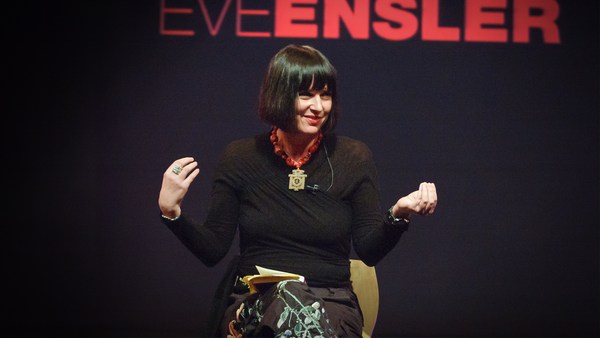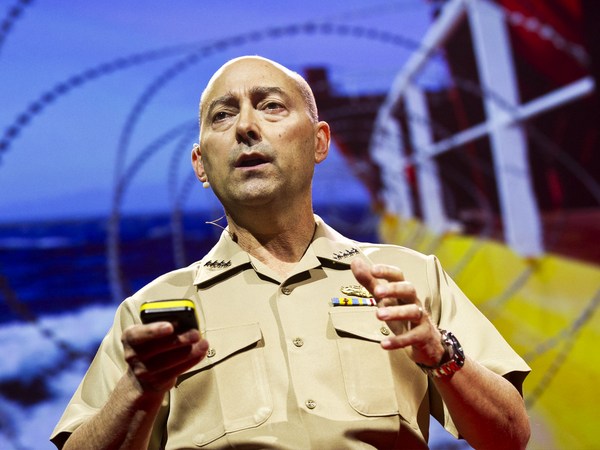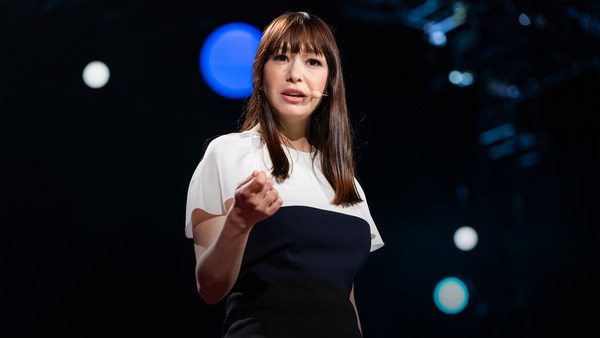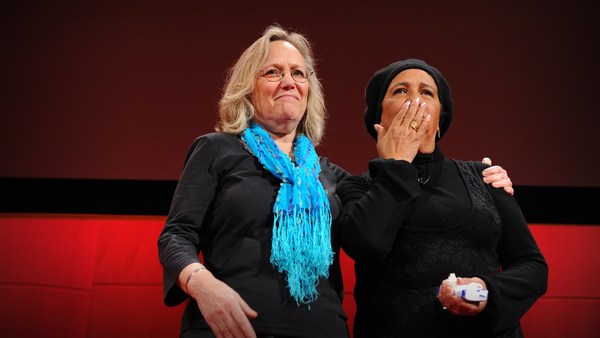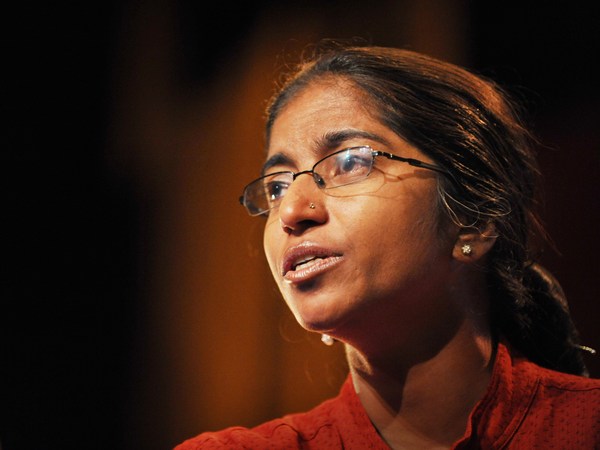I think it'll be a relief to some people and a disappointment to others that I'm not going to talk about vaginas today. I began "The Vagina Monologues" because I was worried about vaginas. I'm very worried today about this notion, this world, this prevailing kind of force of security. I see this word, hear this word, feel this word everywhere. Real security, security checks, security watch, security clearance. Why has all this focus on security made me feel so much more insecure? What does anyone mean when they talk about real security? And why have we, as Americans particularly, become a nation that strives for security above all else? In fact, I think that security is elusive. It's impossible. We all die. We all get old. We all get sick. People leave us. People change us. Nothing is secure. And that's actually the good news.
This is, of course, unless your whole life is about being secure. I think that when that is the focus of your life, these are the things that happen. You can't travel very far or venture too far outside a certain circle. You can't allow too many conflicting ideas into your mind at one time, as they might confuse you or challenge you. You can't open yourself to new experiences, new people, new ways of doing things -- they might take you off course. You can't not know who you are, so you cling to hard-matter identity. You become a Christian, Muslim, Jew. You're an Indian, Egyptian, Italian, American. You're a heterosexual or a homosexual, or you never have sex. Or at least, that's what you say when you identify yourself. You become part of an "us." In order to be secure, you defend against "them." You cling to your land because it is your secure place. You must fight anyone who encroaches upon it. You become your nation. You become your religion. You become whatever it is that will freeze you, numb you and protect you from doubt or change. But all this does, actually, is shut down your mind. In reality, it does not really make you safer.
I was in Sri Lanka, for example, three days after the tsunami, and I was standing on the beaches and it was absolutely clear that, in a matter of five minutes, a 30-foot wave could rise up and desecrate a people, a population and lives. All this striving for security, in fact, has made you much more insecure because now you have to watch out all the time. There are people not like you -- people who you now call enemies. You have places you cannot go, thoughts you cannot think, worlds that you can no longer inhabit. And so you spend your days fighting things off, defending your territory and becoming more entrenched in your fundamental thinking. Your days become devoted to protecting yourself. This becomes your mission. That is all you do. Ideas get shorter. They become sound bytes. There are evildoers and saints, criminals and victims.
There are those who, if they're not with us, are against us. It gets easier to hurt people because you do not feel what's inside them. It gets easier to lock them up, force them to be naked, humiliate them, occupy them, invade them and kill them, because they are only obstacles now to your security. In six years, I've had the extraordinary privilege through V-Day, a global movement against [violence against] women, to travel probably to 60 countries, and spend a great deal of time in different portions. I've met women and men all over this planet, who through various circumstances -- war, poverty, racism, multiple forms of violence -- have never known security, or have had their illusion of security forever devastated. I've spent time with women in Afghanistan under the Taliban, who were essentially brutalized and censored. I've been in Bosnian refugee camps. I was with women in Pakistan who have had their faces melted off with acid. I've been with girls all across America who were date-raped, or raped by their best friends when they were drugged one night.
One of the amazing things that I've discovered in my travels is that there is this emerging species. I loved when he was talking about this other world that's right next to this world. I've discovered these people, who, in V-Day world, we call Vagina Warriors. These particular people, rather than getting AK-47s, or weapons of mass destruction, or machetes, in the spirit of the warrior, have gone into the center, the heart of pain, of loss. They have grieved it, they have died into it, and allowed and encouraged poison to turn into medicine. They have used the fuel of their pain to begin to redirect that energy towards another mission and another trajectory.
These warriors now devote themselves and their lives to making sure what happened to them doesn't happen to anyone else. There are thousands if not millions of them on the planet. I venture there are many in this room. They have a fierceness and a freedom that I believe is the bedrock of a new paradigm. They have broken out of the existing frame of victim and perpetrator. Their own personal security is not their end goal, and because of that, because, rather than worrying about security, because the transformation of suffering is their end goal, I actually believe they are creating real safety and a whole new idea of security. I want to talk about a few of these people that I've met.
Tomorrow, I am going to Cairo, and I'm so moved that I will be with women in Cairo who are V-Day women, who are opening the first safe house for battered women in the Middle East. That will happen because women in Cairo made a decision to stand up and put themselves on the line, and talk about the degree of violence that is happening in Egypt, and were willing to be attacked and criticized. And through their work over the last years, this is not only happening that this house is opening, but it's being supported by many factions of the society who never would have supported it. Women in Uganda this year, who put on "The Vagina Monologues" during V-Day, actually evoked the wrath of the government.
And, I love this story so much. There was a cabinet meeting and a meeting of the presidents to talk about whether "Vaginas" could come to Uganda. And in this meeting -- it went on for weeks in the press, two weeks where there was huge discussion. The government finally made a decision that "The Vagina Monologues" could not be performed in Uganda. But the amazing news was that because they had stood up, these women, and because they had been willing to risk their security, it began a discussion that not only happened in Uganda, but all of Africa. As a result, this production, which had already sold out, every single person in that 800-seat audience, except for 10 people, made a decision to keep the money. They raised 10,000 dollars on a production that never occurred.
There's a young woman named Carrie Rethlefsen in Minnesota. She's a high school student. She had seen "The Vagina Monologues" and she was really moved. And as a result, she wore an "I heart my vagina" button to her high school in Minnesota.
(Laughter)
She was basically threatened to be expelled from school. They told her she couldn't love her vagina in high school, that it was not a legal thing, that it was not a moral thing, that it was not a good thing. So she really struggled with this, what to do, because she was a senior and she was doing well in her school and she was threatened expulsion. So what she did is she got all her friends together -- I believe it was 100, 150 students all wore "I love my vagina" T-shirts, and the boys wore "I love her vagina" T-shirts to school.
(Laughter)
Now this seems like a fairly, you know, frivolous, but what happened as a result of that, is that that school now is forming a sex education class. It's beginning to talk about sex, it's beginning to look at why it would be wrong for a young high school girl to talk about her vagina publicly or to say that she loved her vagina publicly.
I know I've talked about Agnes here before, but I want to give you an update on Agnes. I met Agnes three years ago in the Rift Valley. When she was a young girl, she had been mutilated against her will. That mutilation of her clitoris had actually obviously impacted her life and changed it in a way that was devastating. She made a decision not to go and get a razor or a glass shard, but to devote her life to stopping that happening to other girls. For eight years, she walked through the Rift Valley. She had this amazing box that she carried and it had a torso of a woman's body in it, a half a torso, and she would teach people, everywhere she went, what a healthy vagina looked like and what a mutilated vagina looked like. In the years that she walked, she educated parents, mothers, fathers. She saved 1,500 girls from being cut.
When V-Day met her, we asked her how we could support her and she said, "Well, if you got me a Jeep, I could get around a lot faster." So, we bought her a Jeep. In the year she had the Jeep, she saved 4,500 girls from being cut. So, we said, what else could we do? She said, "If you help me get money, I could open a house." Three years ago, Agnes opened a safe house in Africa to stop mutilation. When she began her mission eight years ago, she was reviled, she was detested, she was completely slandered in her community. I am proud to tell you that six months ago, she was elected the deputy mayor of Narok.
(Applause)
I think what I'm trying to say here is that if your end goal is security, and if that's all you're focusing on, what ends up happening is that you create not only more insecurity in other people, but you make yourself far more insecure. Real security is contemplating death, not pretending it doesn't exist. Not running from loss, but entering grief, surrendering to sorrow. Real security is not knowing something, when you don't know it. Real security is hungering for connection rather than power. It cannot be bought or arranged or made with bombs. It is deeper, it is a process, it is acute awareness that we are all utterly inter-bended, and one action by one being in one tiny town has consequences everywhere. Real security is not only being able to tolerate mystery, complexity, ambiguity, but hungering for them and only trusting a situation when they are present.
Something happened when I began traveling in V-Day, eight years ago. I got lost. I remember being on a plane going from Kenya to South Africa, and I had no idea where I was. I didn't know where I was going, where I'd come from, and I panicked. I had a total anxiety attack. And then I suddenly realized that it absolutely didn't matter where I was going, or where I had come from because we are all essentially permanently displaced people. All of us are refugees. We come from somewhere and we are hopefully traveling all the time, moving towards a new place. Freedom means I may not be identified as any one group, but that I can visit and find myself in every group. It does not mean that I don't have values or beliefs, but it does mean I am not hardened around them. I do not use them as weapons. In the shared future, it will be just that, shared. The end goal will [be] becoming vulnerable, realizing the place of our connection to one another, rather than becoming secure, in control and alone. Thank you very much.
(Applause)
Chris Anderson: And how are you doing? Are you exhausted? On a typical day, do you wake up with hope or gloom? Eve Ensler: You know, I think Carl Jung once said that in order to survive the twentieth century, we have to live with two existing thoughts, opposite thoughts, at the same time. And I think part of what I'm learning in this process is that one must allow oneself to feel grief. And I think as long as I keep grieving, and weeping, and then moving on, I'm fine. When I start to pretend that what I'm seeing isn't impacting me, and isn't changing my heart, then I get in trouble. Because when you spend a lot of time going from place to place, country to country, and city to city, the degree to which women, for example, are violated, and the epidemic of it, and the kind of ordinariness of it, is so devastating to one's soul that you have to take the time, or I have to take the time now, to process that.
CA: There are a lot of causes out there in the world that have been talked about, you know, poverty, sickness and so on. You spent eight years on this one. Why this one? EE: I think that if you think about women, women are the primary resource of the planet. They give birth, we come from them, they are mothers, they are visionaries, they are the future. If you think that the U.N. now says that one out of three women on the planet will be raped or beaten in their lifetime, we're talking about the desecration of the primary resource of the planet, we're talking about the place where we come from, we're talking about parenting. Imagine that you've been raped and you're bringing up a boy child. How does it impact your ability to work, or envision a future, or thrive, as opposed to just survive? What I believe is if we could figure out how to make women safe and honor women, it would be parallel or equal to honoring life itself.
